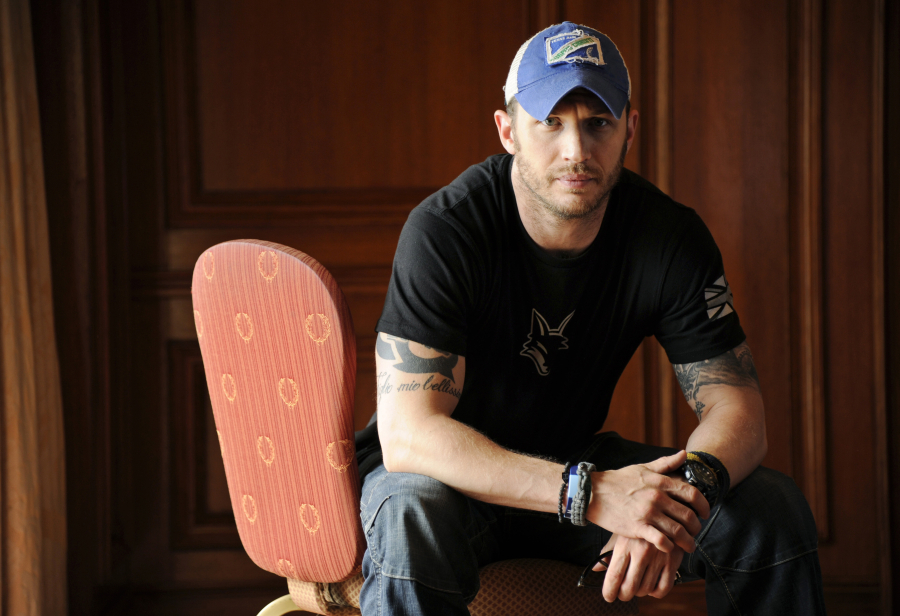A savage. A ghost. A madman.
No one quite knows what to make of James Delaney (Tom Hardy) when he returns to England, seemingly from the dead after going down in a slave ship nearly a decade earlier off the Gold Coast of Africa.
One thing is for sure: He’s not the same young man who left London in 1804 as an “exceptional” corporal in East India Trading Co. He’s now brooding and disturbed, and occasionally mumbles in a Native American dialect that scares the xenophobic population of Regency-period London.
The mystery behind his disappearance — which involves the horrors of the slave trade, hidden family secrets and corporate corruption — is at the heart of the dark, compelling and often-haunting eight-part miniseries “Taboo,” debuting Tuesday on FX.
The BBC 1 production is produced by Oscar winner Ridley Scott and features an impressive cast of British talent, half of whom you’ve seen in “Game of Thrones” (or pick any other notable English drama of the last two years): Jonathan Pryce, David Hayman, Nicholas Woodeson and Roger Ashton-Griffiths. And “Taboo” finds its creators Steven Knight and Tom Hardy working together again after their success on another wonderfully grim drama (is there any other kind from the Brits these days?), “Peaky Blinders.”
Hardy continues his mastery of the deeply disturbed man (Alfie Solomons of “Blinders,” the murderous John Fitzgerald of “Revenant”) with Delaney, a man whose unnerving, dead-eyed stare is rivaled only by that of Oliver Reed’s Bill Sykes in “Oliver Twist.”
Though most everyone around Delaney would prefer to write him off as “utterly mad,” they can’t ignore the menacing man in the dusty black coat and top hat. Since his father died, he owns the family shipping business and a strategic swath of coast in the Pacific Northwest, and the all-powerful East India Trading Co. shipping empire wants both.
The head of the corrupt shipping company, Sir Stuart Strange (Pryce), is willing to do whatever it takes to acquire the estate, while Delaney’s half-sister, Zilpha (Oona Chaplin), has her own designs on their late father’s assets. Delaney and his sibling, however, have been romantically involved, so there’s more to their dealings than just shillings and land deeds — any questions as to why the show’s called “Taboo”?
Like “Peaky Blinders,” “Taboo” is not easy watching. It requires intense focus to keep track of historical references, multiple characters and the complex story lines of his scheming enemies (or are they the good guys?). Subplots include characters navigating the British government’s strained relations with America in the War of 1812, complicated big business schemes that make Goldman Sachs look like rank amateurs and heartbreaking takes on the shipping trade’s most shameful line of business: the slave trade.
But it’s worth the effort. Like Clive Owen as Dr. John Thackery in “The Knick,” a similarly bleak but smart period drama about New York, Hardy gives us such a magnetic central character with Delaney that he alone could carry the drama. But the theme here of big business versus individual morality, and the idea that sometimes the most eccentric among us are not crazy — they just know more — make “Taboo” one of the more unique and thoughtful offerings of the new year.
Madness, after all, runs in Delaney’s family. As an old family servant recalls to Delaney, “Your father spoke in a language that was like ravens fighting.” But is it madness or the echoes of a burdened conscience? In the younger Delaney’s case, it seems the “evil” deeds he did while under the employ of the trading company have made him the man he is today.
Early in the series, he appears complicit in the transport of slaves. But then we find out that, at some point, he went rogue, left the company and is now taking revenge by building his own empire. But is that because of the horrors he witnessed on that slave ship?
The flashbacks he has of his time at sea are of caged African men being trapped in a ship that’s going down. Sometimes the bodies of those he presumably enslaved have come back to haunt him.
His PTSD is, of course, misunderstood among those who populate the stuffy parlors, smoky pubs and rotting docks of early 19th century London. Strange behavior and customs have possessed the once-respectable gentleman; he has mysterious tribal tattoos and scarring, presumably from Africa, mumbles in an utterly foreign dialect and would rather kneel naked by a fire than sip tea in a parlor. Rumor has it he lived and slept with savages and may have even been a cannibal. At least one fight scene seems to back up the latter accusation.
But then, London itself is no picnic. Dirty prostitution dens, men who seem to shower less than the people of Westeros, autopsies so gruesome they, of course, require stomach-turning close-ups.
Through it all, Delaney reveals a little more about himself that perhaps makes him a little less terrifying — or at least more fallible than frightening.



